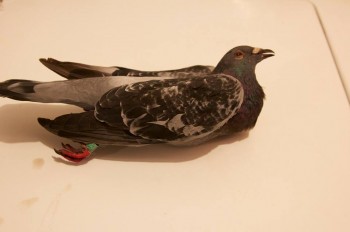Wildwoods received what we believe to be a poisoned pigeon (this post is a downer; read at your own risk). From the staff at Wildwoods:
We got this beautiful racing pigeon, with tremors and other neurological signs suggesting to us that he’d likely been poisoned with Avitrol, a poison often used against pigeons. Our vet was rushing over with a drug to help mute his symptoms until the poison wore off. However, before she could get here, he regurgitated the contents of his crop and choked to death on it. Read more about this terrible poison here.
We believe that poisoning an animal, any animal, is never an acceptable solution to a perceived “pest” problem. And once you add poison to one strand of the web of life, it will go places you didn’t foresee or intend. Pigeons are not the only birds who will eat the poisoned bait. And who might eat the poisoned pigeon?
This beautiful, sleek racer will never race again. And somewhere out there, other pigeons, mourning doves, hawks and falcons may also be dying as well from the poisoned bait and poisoned birds.
Not only does poison stink, but lethal methods of attempted pigeon population control don’t work. Pigeons can out-reproduce the efforts of the people killing them.
One humane pigeon control method pioneered in Europe involves establishing feeding and nesting stations for urban pigeons, and then, 1-2 times/week, visiting the nesting stations and taking away eggs. It works well, nobody dies, and karma is happy.
Another solution is OvoControl, promoted by the HSUS. Pigeons who eat this drug at feeding stations will lay infertile eggs, so flock size drops. Nobody dies, yet fewer pigeons; another win/win.
Pigeons are beautiful, intelligent, athletic birds with many amazing abilities. Pigeons have been treasured by humans for millennia.
